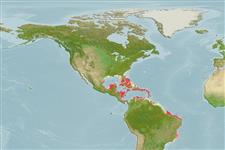Common names from other countries
Teleostei (teleosts) >
Gobiiformes (Gobies) >
Gobiidae (Gobies) > Gobiinae
Etymology: Coryphopterus: Greek, koryphe = summit + Greek, pteron = fin, wing (Ref. 45335).
More on authors: Böhlke & Robins.
Environment: milieu / climate zone / depth range / distribution range
Ecology
Marine; reef-associated; depth range 3 - 20 m (Ref. 9710). Subtropical
Western Atlantic: southern Florida in USA and Bahamas to southeastern Brazil (Ref. 51894).
Size / Weight / Age
Maturity: Lm ? range ? - ? cm
Max length : 5.0 cm TL male/unsexed; (Ref. 7251)
Dorsal spines (total): 6; Dorsal soft rays (total): 9 - 10; Anal spines: 1; Anal soft rays: 10; Vertebrae: 26. Pelvic frenum absent. Innermost pelvic-fin rays branched, connected to the ray of the opposite side by a basal membrane and smaller than immediately adjacent one (66 - 77% of its length). Elongate spine in the first dorsal fin absent. No spot above opercle (Ref. 52312).
Two distinct dark spots, one above other, on pectoral fin base (Ref. 26938). With numerous small brown spots, the largest a series of 6 along lower side, and small pale blue-green flecks; horizontal dark lines on head, the most prominent posterior to eye; a vertical blackish line or two blackish spots at base of caudal fin (Ref. 13442).
Inhabits coral reefs, tide pools, limestone caves, algae-covered rocks and isolated patch reefs surrounded by white sand (Ref. 5521).
Life cycle and mating behavior
Maturities | Reproduction | Spawnings | Egg(s) | Fecundities | Larvae
Robins, C.R. and G.C. Ray, 1986. A field guide to Atlantic coast fishes of North America. Houghton Mifflin Company, Boston, U.S.A. 354 p. (Ref. 7251)
IUCN Red List Status (Ref. 130435)
CITES (Ref. 128078)
Not Evaluated
Threat to humans
Harmless
Human uses
Fisheries: commercial; aquarium: commercial
Tools
Special reports
Download XML
Internet sources
Estimates based on models
Preferred temperature (Ref.
115969): 26 - 28.2, mean 27.4 (based on 697 cells).
Phylogenetic diversity index (Ref.
82804): PD
50 = 0.5001 [Uniqueness, from 0.5 = low to 2.0 = high].
Bayesian length-weight: a=0.00708 (0.00333 - 0.01504), b=3.09 (2.92 - 3.26), in cm Total Length, based on LWR estimates for this (Sub)family-body shape (Ref.
93245).
Trophic level (Ref.
69278): 2.7 ±0.4 se; based on size and trophs of closest relatives
Resilience (Ref.
120179): High, minimum population doubling time less than 15 months (Preliminary K or Fecundity.).
Fishing Vulnerability (Ref.
59153): Low vulnerability (10 of 100).
